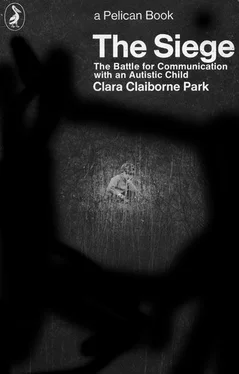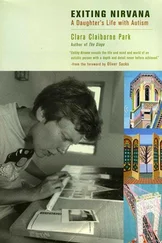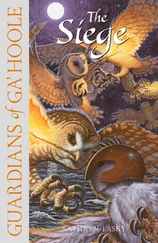Where then are we now, and where are we going? The social worker at Hampstead told me we could never make up the lost years — and if there is a biological deficiency, we cannot make that up either. Yet Elly has improved and is improving. She has moved far beyond what she seemed likely to achieve in her early years, and a comparison of her case with other histories of children claimed as autistic could be used to support considerable optimism. Dr Bruno Bettelheim’s The Empty Fortress , which appeared just as I was completing these final chapters, is a hopeful book. In it he describes children who at Elly’s present age were functioning far less well than she; he considers the condition of even such children curable if therapy is extensive, prolonged, conducted in a residential setting, and begun well before puberty. [37] Dr Bettelheim is by far the most optimistic of any writer on infantile autism. He reports that of the 40 autistic children treated at his school, all improved, 17 making a ‘fair’ adjustment and 15 a ‘good’ one. Although it is not made clear what the ‘adjustment’ consists of, the implication is strong that it includes normal or quasi-normal cognitive and affective functioning as an adult in a nonsheltered environment. Of the three cases around which the book is centred, however, only one recovered in this sense, and no follow-up data is given for the other 37. Moreover, it may be questioned how many of these cases would be accepted as autistic by other specialists. Rimland has developed a detailed questionnaire to facilitate a differential diagnosis between autism and childhood schizophrenia and to increase the likelihood that the growing number of people who discuss infantile autism are talking about the same condition. So far, Dr Bettelheim has been unwilling to furnish completed questionnaires on any of his cases.
Elly’s psychiatrist is encouraging too; a year ago he told me of a boy he knew of who seemed much like Elly and who ended up at Harvard. But then he adds that there is no point in looking even twelve months ahead. Neither he, nor we, nor anyone else knows what will become of her. The most we can say is that at one time the prognosis was nearly hopeless, and that now there is no prognosis at all.
We cannot assess the results of our work, or even understand what we have actually been doing. Were we changing Elly’s assessment of the world? Were we slowly, painfully performing for the emotions what the strange new physical disciplines seem to do for damaged brains, as injured children and adults crawl themselves back to function? Were we too, by activities repeated a thousand times and more, training other brain cells and other nerves to take over missing functions? Were we indeed doing anything, or would what has happened have happened without us? There can be no controlled experiments with the same human being. We shall never know.
It is a long time since we first recognized that ‘something was wrong with Elly’. Perhaps these common words are the best ones after all; they do not disguise under multifoliate terminology the plain fact that no one yet knows what. It has been a long siege. As a siege, it has been successful, for we have reached Elly. Whatever else she is, she is no longer walled off from affection. Yet we are not the first to discover that to reach another human being is not in itself to cure; we are not the first to learn that though the contact which seemed impossible may at length be made, it only opens the future to the work to be done. The expectation of cure is a luxury we have learned to do without. We work, and others work with us, and Elly grows and slowly she comes to do a little work herself. We work for what we can accomplish; we accomplish new things with each month that passes. We get our satisfaction from our motion forward. No more than Elly do we envisage the future.
When much effort is expended for a goal that remains uncertain, the detached mind is bound to wonder if it is worth it. We who are engaged in the labour learn not to ask such questions, since we can afford only such thoughts as strengthen effort and do not paralyse it, but even we cannot suppress them wholly. The child in the poem could not help asking, ‘And what good came of it at last?’ And of course we could not go on if we had not found some answer.
If nothing more were accomplished than an expansion of the possibilities for one flawed human being, some might accept that the work was worth while. But more has come of it than that. Out of it has come, for ourselves and I hope for others, an increment of experience which is, I hope, implicit in every chapter of this book. It will not take many words to make it explicit; most readers who have penetrated this far will already have understood for themselves that what we have learned watching the slow-motion growth of one small rudimentary human being behind invisible walls has applications that go beyond this single child. We saw Elly as a citadel which it was our choice to attack, because the equilibrium she had found denied the possibility of growth. There are others, very different from Elly, who like her cannot meet the challenge of their world and who achieve an equilibrium at the expense of their potentialities. I am a teacher, and from Elly I have learned much about students-about normal students, many of high intelligence, who talk and read and understand and go about their business and yet who challenge our ideas of normal and abnormal because they are so like Elly. The severest problem of teaching — particularly in teaching those we coolly call the ‘culturally disadvantaged’ — is in motivation, in the confrontation of the array of blocks against learning and against achievement itself. The blocks are many and their disguises are subtle — blocks against a subject, against an approach, against a necessary way of working; blocks against continuing education; blocks against seeking a job in line with ability. The personality whose major work is to deny or frustrate its own potentialities operates in ways more complex than Elly’s, though hers are perhaps no less refined. I have lived with learning blocks eight years, watched their inception, seen them so potent that they can inhibit not only learning but the primary faculties of sight and hearing as well. From a child who can counterfeit deafness there is much to learn about how human beings limit or destroy themselves.
Strange Elly is so like us. In her the immobilization that afflicts us all, often or sometimes, temporarily or in full finality, before the task that seems impossible is seen magnified into full visibility. I watch her squint her eyes shut before a reality she doesn’t want to look at, and recognize my students and myself.
I learn from Elly and I learn from my students; they also teach me about Elly. In the early years, I knew a student who was himself emerging from a dark citadel; he had been to the Menninger Clinic and to other places too, and he knew from inside the ways of thought I had to learn. ‘Things get too much for her and she just turns down the volume,’ he told me. I. remembered that, because I have seen it so often since, in Elly and in so many others. Human beings fortify themselves in many ways. Numbness, weakness, irony, inattention, silence, suspicion are only a few of the materials out of which the personality constructs its walls. With experience gained in my siege of Elly I mount smaller sieges. Each one is undertaken with hesitation; to try to help anyone is an arrogance. But Elly is there to remind me that to fail to try is a dereliction. Not all my sieges are successful. But where I fail, I have learned that I fail because of my own clumsiness and inadequacy, not because the enterprise is impossible. However formidable the fortifications, they can be breached. I have not found one person, however remote, however hostile, who did not wish for what he seemed to fight. Of all the things that Elly has given, the most precious is this faith, a faith experience has almost transformed into certain knowledge: that inside the strongest citadel he can construct, the human being awaits his besieger.
Читать дальше












